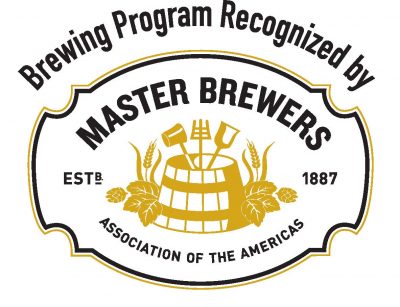 Malting and brewing at Davis are primarily taught within the framework of either the BS in Food Science or the MS within the Food Science Graduate Group.
Malting and brewing at Davis are primarily taught within the framework of either the BS in Food Science or the MS within the Food Science Graduate Group.
However, the UCD system is one of high flexibility, so that students majoring in other disciplines may also take the courses in malting and brewing. These disciplines might include, for example, Viticulture & Enology, Biochemistry, Biotechnology and Engineering.
In this way a company can expect to identify at Davis students who have the necessary primary disciplines required for a given job (e.g. chemical engineering) but who have also been giving a significant grounding in malting and brewing science. Equally, a student has the benefit of not being channeled irretrievably into a specific discipline as would be the case if they pursued a degree course associated with a specific industry: a graduate seeking employment possessing a degree including the word Brewing may be restricted in their opportunities for employment.
Presently three formal courses (FST codes) are given:
3 Introduction to Beer and Brewing. The course aims to introduce the student in a responsible manner to beer as a major international beverage and to brewing as a traditional yet highly controlled and innovative industrial process. It encompasses a description of the nature of the world’s brewing business, how it has evolved and what the factors are which influence its shape and dynamics. The course illustrates brewing as a good example of the application of a microbial process to the needs of mankind, but also illustrates how a range of sciences (including plant physiology, chemical engineering, biochemistry, microbiology) also impinge on the conversion of barley and hops into beer. It addresses in a manner accessible to those with only basic science knowledge: (a) the relevance of plant physiology and agronomy in respect of selection and cultivation of barley and hops (b) an outline of the chemical composition of barley and hops and the significance for malting and brewing (c) an explanation of the biochemical and chemical conversions occurring during malting and brewing (d) an understanding of the relevance of yeast cell structure and metabolism to the production of consistent beer (e) an appreciation of the impact which physics and engineering sciences have on the brewing process and on beer (f) an introduction to the sensory and psychophysics dimensions of beer quality. Since the Spring Quarter of 2017 it has been possible to take an on-line version of this class
102A Malting & Brewing Science The aims of this course, which is classroom taught, are to provide the student with a thorough appreciation and understanding of the science and technology of brewing. It delves deeply and informs on everything from barley breeding to beer at point of sale.
102B Practical Malting & Brewing This takes the student from the lecture room and to the bench and the pilot brewery, where they carry out practical brewing work and pursue analytical investigations which challenge their understanding of the intricacies of the processes involved in converting barley to beer. The class features a brewing competition with the winning team producing their beer commercially at the Sudwerk Brewery.
Please address all queries about the teaching of brewing on the UC Davis campus to my successor, Glen Fox (https://foodscience.ucdavis.edu/people/glen-fox#/).